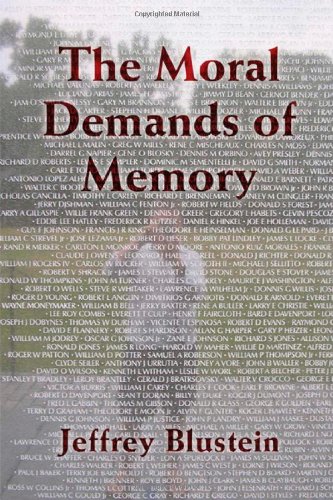

Most ebook files are in PDF format, so you can easily read them using various software such as Foxit Reader or directly on the Google Chrome browser.
Some ebook files are released by publishers in other formats such as .awz, .mobi, .epub, .fb2, etc. You may need to install specific software to read these formats on mobile/PC, such as Calibre.
Please read the tutorial at this link: https://ebookbell.com/faq
We offer FREE conversion to the popular formats you request; however, this may take some time. Therefore, right after payment, please email us, and we will try to provide the service as quickly as possible.
For some exceptional file formats or broken links (if any), please refrain from opening any disputes. Instead, email us first, and we will try to assist within a maximum of 6 hours.
EbookBell Team

4.1
60 reviews
ISBN 10: 0521709725
ISBN 13: 9780521709729
Author: Jeffrey Blustein
Despite an explosion of studies on memory in historical and cultural studies, there is relatively little in moral philosophy on this subject. In this book, Jeffrey Blustein provides a systematic and philosophically rigorous account of a morality of memory. Drawing on a broad range of philosophical and humanistic literatures, he offers a novel examination of memory and our relations to people and events from our past, the ways in which memory is preserved and transmitted, and the moral responsibilities associated with it. Blustein treats topics of responsibility for one's own past; historical injustice and the role of memory in doing justice to the past; the relationship of collective memory to history and identity; collective and individual obligations to remember those who have died, including those who are dear to us; and the moral significance of bearing witness.
1 MEMORY AS A SUBJECT OF EVALUATIVE INQUIRY
1. ELEMENTS OF A MORALITY OR ETHICS OF MEMORY
2. NIETZSCHE ON THE MISUSES OF MEMORY
(a) Monumental history and the influence of the past
(b) Antiquarian history and nostalgia
(c) The moderating role of critical history
3. A SURFEIT OF MEMORY
4. THE DYNAMIC OF REMEMBERING AND FORGETTING
(a) Collective memory
(b) Personal memory
5. MEMORY AS OBLIGATION
6. RESPONSIBILITIES OF REMEMBRANCE AND TAKING RESPONSIBILITY FOR THE PAST
7. MEMORY, IDENTITY, AND RESPONSIBILITY
8. GOING FORWARD
NOTES
2 TAKING RESPONSIBILITY FOR ONE’S OWN PAST
1. A CASE EXAMPLE
2. SOME PRELIMINARIES ABOUT TAKING RESPONSIBILITY
3. THREE ELEMENTS OF TAKING RESPONSIBILITY FOR THE PAST
(a) Retrospective construction of meaning
(b) Appropriation
(c) Thematization
(d) Interconnections
4. APPLYING THE ANALYSIS: THE CASE OF PSYCHOPHARMACOLOGY
5. WHY WE DON’T TAKE RESPONSIBILITY FOR OUR PAST
6. HUMILITY AND TAKING RESPONSIBILITY FOR ONE’S PAST
7. SELF-FORGIVENESS AND TAKING RESPONSIBILITY FOR ONE’S PAST
8. CONCLUDING THOUGHTS ON MEMORY
NOTES
3 DOING JUSTICE TO THE PAST
1. A HISTORICAL EXAMPLE: THE TULSA RACE RIOT OF 1921
2. TYPES OF GROUPS
(a) Collections
(b) Socially unified groups and their importance
(c) Organized groups
3. COLLECTIVE RESPONSIBILITY FOR PAST WRONGDOING
(a) Senses of collective responsibility
(b) Group identity over time
(c) A note about “different people choices” and groups
4. WRONGING GROUPS
5. MAKING SENSE OF THE PAST: RECONSTRUCTION AND COMPLICATIONS
6. RESPONSIBILITY AND THE CONSTRUCTION OF GROUP IDENTITY
7. COLLECTIVE GUILT AND SHAME
8. DOING JUSTICE TO THE PAST: THE ROLE OF MEMORY
(a) Memory and the demand for recognition
(b) Symbolic reparation and memory
NOTES
4 ETHICS, TRUTH, AND COLLECTIVE MEMORY
1. MEMORY AND HISTORY/HISTORY AND MYTH
2. COLLECTIVE MEMORY AND INDIVIDUAL MEMORY
3. HISTORY, MYTH, AND COLLECTIVE MEMORY
4. THE INTERPLAY OF HISTORY AND MYTH IN COLLECTIVE MEMORY
5. MARGALIT ON THE ETHICS AND MORALITY OF MEMORY
6. MORALITY AND COLLECTIVE MEMORY
7. ETHICS AND COLLECTIVE MEMORY
8. CONCLUSION
NOTES
5 THE RESPONSIBILITY OF REMEMBRANCE
1. RAISING THE ISSUES: ABSENT FRIENDS, DECEASED FRIENDS
2. QUALITIES AND MODES OF REMEMBERING THE DEAD
3. EVALUATIVE ATTITUDES AND REMEMBERING THE DEAD: THE CASE OF LOVE
4. CONSEQUENTIALISM AND AN EXPRESSIVE ACCOUNT
(a) Consequentialism
(b) Expressivism
5. THE MORAL IMPERATIVE TO REMEMBER: THREE ARGUMENTS
(a) The rescue from insignificance view
(b) The enduring duties view
(c) The reciprocity view
(d) The three views in tandem
6. MOURNING AND THE DEATH OF PARENTS
7. RITUALS OF REMEMBRANCE
8. HOW LONG WE MUST REMEMBER
NOTES
6 MEMORY AND BEARING WITNESS
1. WITNESSING IN THE CONTEMPORARY WORLD
2. THE CONCEPT OF BEARING WITNESS
(a) Testimonial authority
(b) Address and audience
(c) The need for testimony
3. SOME TYPOLOGICAL REMARKS
(a) Bearing witness to right and wrong, good and bad
(b) The witness’ relationship to wrongdoing
(c) Bearing witness to one’s convictions
4. THE SYMBOLIC VALUE OF BEARING WITNESS
5. WITNESSING, SELF-REPRESENTATION, AND MORAL AGENCY
6. PROXIES AND THE AUTHORITY TO BEAR WITNESS
7. FINAL THOUGHTS
NOTES
the moral demands of memory
the moral challenge of alzheimer disease
the moral domain
the moral model of disability
moral memory
a moral decline
Tags: Jeffrey Blustein, Demands, Memory